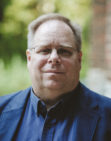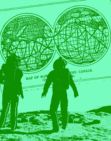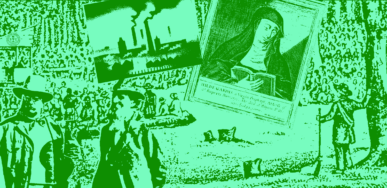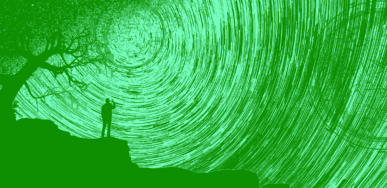Planet B
Kurtis Schaeffer [00:00:00] I'm Kurtis Schaeffer.
Martien Halvorson-Taylor [00:00:01] And I'm Martien Halvorson-Taylor. And this is Sacred & Profane.
Kurtis Schaeffer [00:00:07] This episode is part of our ongoing series on climate change and religions in the United States. We call it Between Heaven and Earth. And the big question we're looking at is how religion has shaped the way Americans think about and live on the land, and how the land has shaped religion.
Martien Halvorson-Taylor [00:00:24] Which is why we found ourselves on the top of a mountain on a snowy morning in January with our colleague, astronomer Kelsey Johnson. That's right. To be specific, we were standing on Mars Hill, which is at the heart of Lowell Observatory and Flagstaff, Arizona.
John [00:00:43] So let me give you a little bit of, insight into where we're headed. We're going to go up to that dome that you see on the right. That is what we call the Clark Dome and the Clark Dome, was, put up there by our founder, Mr. Percival Lowell, in 1896.
Kelsey Johnson [00:01:06] I wanted to bring you there for a few reasons. One, we were hoping to be able to observe the night sky, and the spot was chosen all the way back in the 1800s because of the clear skies in Arizona.
John [00:01:20] Percival Lowell was from Boston. So he reconnects with some of the astronomy faculty there at Harvard, and they advise him, don't start your observatory in Massachusetts. It's too cloudy. A little ironic on a day like today when. But nevertheless, they said, go to Arizona, for the skies are clear and you can find high elevation locations.
Kyler Kuehn [00:01:42] Because of the lighting ordinances. You can still actually see the Milky Way. So right here, if you're looking out over the city,.
Kelsey Johnson [00:01:48] That's amazing.
John [00:01:50] Yeah it is. It's a great place and it's easy access. You can see how close it is from downtown for people to come up here and enjoy it.
Kelsey Johnson [00:01:59] We were unlucky that day, but Lowell has clear skies most of the year, and astronomers working there have made all sorts of super important discoveries, the most famous of which is Pluto. But even before Pluto, Vesto Slipher made observations that indicated the universe was actually expanding. Even before Hubble found it. And Vera Rubin made key discoveries about dark matter right here at Lowell Observatory. Discoveries that, in my opinion, she should have won a Nobel Prize for.
Kurtis Schaeffer [00:02:34] Like John mentioned. Lowell Observatory was founded by Percival Lowell, a mathematician and astronomer who was heir to a textile fortune. Despite those far flung discoveries, he originally chose Flagstaff and its clear night skies to look at something closer to home. Our nearest neighbor, Mars.
John [00:02:55] All right. Let me show you the way. Inside the dome. This.
Kurtis Schaeffer [00:03:00] Lowell was a Harvard man. So when he read the work of an Italian astronomer who had been observing Mars, he read it in the original Italian. And he became obsessed with one word in that paper. Canali.
John [00:03:15] Mars. Now, these features are interesting because the Italian word canali translates to English as channels, and that could either mean a river channel or a constructed canal. A person took it to mean the latter when he heard about the word of work of early, and he studied Mars himself, he understood there to be a planet wide system of canals. And of course, if you're suggesting there's canals on Mars, there has to be intelligent life to have built those canals.
Kurtis Schaeffer [00:03:51] If, like this paper seemed to say, there were canals on Mars, surely there was not just water, but intelligent life.
John [00:04:00] Lowell wanted to prove it. And you know, today a lot of people look back on that so well, how can anybody believe on, you know, intelligent life on Mars where we have the advantage of hindsight, right? We have missions to Mars. We've landed on Mars with, robots and things, and we now know, that that's not the case. But, back in the 1890s, this is what inspired Percival, to start his own observatory. So this is a telescope. He looked at Mars and other objects in space, and he came to some of those interesting conclusions.
Kelsey Johnson [00:04:37] We now know, as Elton John put it, that Mars ain't the kind of place to raise your kids. It's cold, there's no liquid water and almost no atmosphere. But Leo was obsessed with Mars. He published three popular books outlining his observations of Mars and its canals, and he traveled the country giving talks about what life there could look like. And his work ignited an explosion of popular interest in Mars. Writers imagined all sorts of versions of our neighbor, from scientifically advanced utopias to a literal Second Earth, inhabited by beings living out their own version of events in the Bible.
Kurtis Schaeffer [00:05:24] And over 100 years later, quite a few Americans do look at Mars differently not as a heavenly body, but as a neighbor. A place to aspire to, perhaps even a refuge for our climate crisis. A planet B, if you will.
Kelsey Johnson [00:05:38] That's right. You know, as we were touring Lowell's telescopes, this came up. Cuyler Kuhn, he's Lowell's director of technology, was showing us around, and he started talking about a video game he's playing where the goal is to terraform Mars, to make it enough, like Earth, that humans could survive there.
Kyler Kuehn [00:05:59] Or you can do things like crash an icy comet into the the mouth to add an ocean and things like that. But, it's sort of it's really it's a fun game and it has a lot of science you would have to do to, to make Mars habitable. The one thing it doesn't really address, it's sort of the big showstopper is just there's no atmospheric pressure. So any atmosphere you put there is going to go away eventually. There's no magnetic field. So then you get a lot of the radiation, that, you know, causes cancer on Earth. So, not much else and much easier to just fix what's going on in Earth and try to create a whole new planet that we could live on. So it it's sort of a pipe dream to think that we can, you know, just run away to Mars after we've broken Earth like it's it's not going to be any easier. I need you there. Long story short, I think we're just going to take all the things we already have and exploit them with us.
Kelsey Johnson [00:07:09] But of course, Mars isn't just a planet B in a video game. It may be a pipe dream, but it's one that has billions of dollars being poured into it.
Kurtis Schaeffer [00:07:20] These days, Mars is the object of a new space race, with government agencies and corporate actors like Elon Musk vowing to send manned missions to begin colonizing the Red planet. And it's easy to look at efforts to build settlements on Mars as a strictly secular endeavor. What could be more purely scientific than space travel, after all? Sending someone to Mars requires precise calculations and technical knowhow. But we don't leave religion behind just by leaving Earth.
Mary-Jane Rubenstein [00:07:51] So the most prominent advocate of this notion of Mars as a kind of backup planet or a plan B, is Elon Musk the sort of omnipresent techno prophet. Everybody's heard of him at this point.
Kurtis Schaeffer [00:08:04] That's Mary-Jane Rubenstein.
Mary-Jane Rubenstein [00:08:07] Hi, I'm Mary-Jane Rubenstein. I teach religion and science in society at Wesleyan University.
Kurtis Schaeffer [00:08:14] We wanted to talk with Mary-Jane because the corporate space race, kicked off by billionaires like Musk and Jeff Bezos, may seem drawn from science fiction more than scriptures, but how we think about space and our place in it is actually deeply steeped in religious tradition.
Mary-Jane Rubenstein [00:08:31] Secular disciplines and secular endeavors like economics, politics, and science have inherited certain religious assumptions that they then come to take as just true or self-evident. So one of these myths we could call it a myth, is that humans are the most important things in the cosmos, that we are somehow the most complex, the most evolved, and therefore the most important. As far as Elon Musk is concerned. Humanity is facing some kind of imminent crisis, and he's not exactly sure what it is, but something is going to come and wipe out all of us. So that thing might be a gargantuan asteroid that will wipe us out the way that an asteroid seems to have wiped out the dinosaurs. Or it might be nuclear war. Humanity is going to be wiped out in one way or another. Reasons Elon Musk. Therefore, we have two options. Either we let ourselves go extinct, or we figure out a way to survive collectively as a species. The notion that humans are the most important beings in the universe is a specifically mythological production, and it comes from a number of places. But one of the places that comes from the West most intensely is the biblical tradition that tells us that human beings are made in the image of God, so the creator favors human beings over everybody else. There's another method in animacy of land that mountains and rivers and trees and rocks don't themselves have any inherent value, or any personhood or any agency or anything like that. That, again, above all, it's humans who have agency and therefore land is, worth nothing on its own, but only worth something insofar as it's useful to human beings. Now, listen, this is a terrible interpretation. I think of Genesis one and two and three in particular. But it is an interpretation of Genesis one, two and three that becomes received and it becomes entrenched, particularly with the advent of capitalism. And as Christian imperialism begins to unsettle those indigenous cosmologies that teach us that the more the human world is actually filled with persons. So these are some of the myths, I think, that come from specifically a Jewish and then Christian and in Christian imperial place and begin to masquerade as just self-evident scientific truth, such that it seems just self-evidently true that we can do whatever we want, for example, to the moon, because there's nothing there. That's only true from a particular perspective, but it's a perspective that seems to announce itself as scientific truth.
Martien Halvorson-Taylor [00:11:07] You know, we, did an episode on the Doctrine of Discovery, which was the Catholic Church's official approval of European colonization for many centuries. And that kind of thinking was very much at the heart of it. And it's striking that we're replaying those ideas in space.
Mary-Jane Rubenstein [00:11:24] Right. So the doctrine of discovery, as your, your previous guest was explaining, tells Europeans that any land they might discover that seems not to have been improved or owned by anybody else is effectively, terra nullius, which is to say, no, no one's land. And so that it can be taken and it can be theirs, and it can be remade in their own image. The minute the space race gets started in the 1950s in earnest, former Nazi rocket scientist Vernoff on pollen starts talking about the ascent into the heavens as a kind of vertical extension of manifest destiny, just as God had called certain people across the entire North American continent, God is now calling Americans, in particular Americans up to the heavens, to conquer the moon and to conquer other planets and to conquer the cosmos itself. And as recently as 2019 and 2020, Mike Pence and Donald Trump announced the new plan to go back to the moon and eventually to Mars, as again a sort of new chapter of manifest Destiny. And they assured us that wherever Americans would go in the cosmos, God would be with Americans because God was calling America to go conquer a new frontier, perhaps even an infinite frontier in outer space.
Kelsey Johnson [00:12:45] Martien can I just send this back to you a little bit? As an Old Testament, you know, as a Hebrew Bible scholar. Clearly you must have your own take on everything that Mary Jane just talked. Yeah. How does your experience with the Hebrew Bible map onto this?
Martien Halvorson-Taylor [00:13:02] I mean, I think that's a very interesting question. So definitely, I see the Bible has been mined to endorse this view of the earth, this view of colonization. You know, what's interesting to me is that a lot of those passages were written by exiled Jews who felt marginalized from the centers of power. And so when they say humanity was created in the image of God, they're actually speaking against a creation myth by their Babylonian captors that says, you know, humanity was created to do the drudge work of the gods.
Mary-Jane Rubenstein [00:13:44] I think that's absolutely right. And it's I think also of, say, the Great Commission, right, in which, Jesus tells his disciples, you know, go, therefore I make disciples of all nations. I mean, saying that to a band of like, long haired, drop out, smelly hippies who don't have any standing in the world, and an occupied land is a completely different one.
Martien Halvorson-Taylor [00:14:04] Nobody wants to have them for dinner.
Mary-Jane Rubenstein [00:14:06] Exactly. Go. Yeah, sure. Go make disciples of all nations. Completely different from telling Imperial Rome to go and make disciples of all. Yeah, yeah. Yeah. So these these texts, I think it's really helpful to say that were written initially by oppressed and displaced people looking to claim a place for themselves in the world can do some real damage in the hands of the oppressors who are oppressing them in the first place, right?
Martien Halvorson-Taylor [00:14:33] Mary Jane, you, raised something very interesting in your book, which is that, of course, this way of reading the Bible continues, and it's in the halls of Congress, and it's been in the white House, and it's certainly in NASA, but it is also, Christians who stand with the people at standing Rock, for example. There is also a progressive strain of Christianity that is trying to claim the Bible in a different sort.
Mary-Jane Rubenstein [00:14:59] Oh, absolutely. Anybody who's reading the Bible with any kind of love of the earth and its inhabitants is reading it in completely different ways than the ones that are that are kind of uncritically taken up by nations and corporations at this point.
Martien Halvorson-Taylor [00:15:14] Right? Okay. So so let's let's think about it coming from, at it from a slightly different angle. If colonizing space, as you say, is a fundamentally religious issue, religious in the sense that religious ideas have come to inform how we think about space and our right to colonize it. Do you see other ways of thinking? Are there other solutions for how to approach space, ways of engaging with space that are not, inflected with that kind of understanding?
Mary-Jane Rubenstein [00:15:52] Yes, absolutely. Okay, so there are a few moves that we have to make. The first move that I'm asking listeners to make is to go along with me and affirm that some of the so-called truths and assumptions that are guiding our relationship to outer space are actually religious in origin. That's like the first leap I'm asking people to make. The second, then, is to say, okay, so if we have these religious ideas, these bad ideas, ideas, structuring our current enterprises in space, what do we do differently? And one could be forgiven for thinking that the answer would be we'll get rid of religion, right? If religion is doing all this damage, get rid of religion. I imagine you are going to share this position with me. Martine. You don't get rid of religion just by thinking. You get rid of religion, right? These are communal formations that have structured the way that our ancestors have thought, that we have thought. Can't get rid of religion any more than you can. Like get rid of economics. We can get rid of money, but we couldn't get rid of trade. It's just a part of the way that we operate. So and in fact, what I'm trying to show is that it's precisely where we think we're done with religion, that it does the most damage because we can't see it, and it operates as though it's just truth. It's what religion gives us is stories. And if we like them and they're doing good work for us, fantastic. And if we don't, we can make up different stories. So I'm not going to go the route of telling us that we should get rid of religion. I don't think it's possible. And I actually think it's dangerous to try. Instead, I think that it would be a delightful thing to do, to listen to the voices of other kinds of religious traditions. And so in the book, I turn to numerous indigenous voices, for example, Bowker, people of northern Australia who are increasingly concerned about the disaster that Western nations are making in outer space and what they, caution is that space, as they say, is not actually empty. We think of it as outer. They say it's not outer. It's part of our neighborhood, and we call it empty space. It's not empty space. It is filled with the ancestors of their people that when anybody in their boyhood community dies, their, their personhood, passes up through, the sort of space ways up to the Milky Way with which what they call the river of stars, and these space ways need to be clear and clean and free from militarism and garbage in order to allow these ancestors to pass. This does not mean that we can't explore outer space. This does not mean we can't visit outer space. But we need to visit the way that you would visit anybody else's home or territory, which is to say with respect, without destroying it, without polluting it. Finally, the last place you can look for other stories is in, like the Jewish and the Christian in the Islamic tradition, which sells these monotheistic traditions that, you know, people like me tend to accuse of having been complicit in the destruction of the earth. Read properly, read well, read decently, and read with, you know, a shred of love for the earth and its communities. These texts actually inspire, ethics, of stewardship, of care, of hospitality, of generosity toward the stranger. And so you can go to almost anybody who's actually in these communities. I don't mean people who are sort of using them to make people feel glorious about what they're up to. The Reverend Walter Kim, who is the president of the National Association of Evangelicals, who says that it is Christian's primary duty to be good stewards of the earth that God has given them. Pope Francis, the head of the Roman Catholic Church, says that capitalism is destroying the earth and that the only way to live a decent, godly existence is to abolish the systems that have oppressed the poor and have destroyed the earth. So other stories are all over the place. We just need to give them a little bit of breathing room and allow them into our allegedly secular institutions, which is to say, economics, politics and science.
Kurtis Schaeffer [00:20:19] As we were finishing up our tour of Lowell's telescopes, John and Kyler took a moment to show us some of the original maps of Mars that Lowell published. They had been made into a globe that was lit from within, showing the branching canals that Lowell observed.
Kyler Kuehn [00:20:36] So that's a lot of basically striations, vertical and horizontal and some angles. And that's the map that Percival Lowell drew. And there's some, debate about exactly why why he thought that was there, whether it was in the optics of the telescope. It's it's certainly not there in reality.
Kelsey Johnson [00:20:56] No one else was ever able to observe the canals that Lowell mapped out, either via telescope or through closer observation of Mars. There's a theory that what he actually saw were the veins of his own eye reflected back at him in the telescope.
Kyler Kuehn [00:21:14] So maybe it was the optics of the telescope. Maybe it was the reflection of the blood vessels in his eyes. I've heard that's potentially a story, because it looks like the back of a human eyeball a little bit with those striations.
Kelsey Johnson [00:21:26] There's a word for that, by the way. Pareidolia.
Kyler Kuehn [00:21:31] Which is the human eye recognizing or finding patterns that aren't really there. The same way you see pictures in clouds or the same way. Not so long ago, there was the idea of the face on Mars. Everybody remembers that from, I don't know, the 90s don't know. It was just a regular mountain. And the fact that the, orbiter took a picture at a certain angle where there were shadows, it looked like eyes and a nose and that, you know, turned into, the exact same sort of thing. People thinking that was evidence of life on Mars, that that went away once we got better pictures. But, just the fact that people thought there were patterns like this and Brits were long in particular thought they were patterns like this is what led to the idea of these are intelligently created, but again, just pareidolia.
Kelsey Johnson [00:22:18] Percival Lowell's Maps of Mars show the power of the stories we tell ourselves. If Lowell hadn't been convinced that he would see canals, would he have realized what he was actually seeing? The stories we tell affect how we understand the world around us, and they will affect how we understand space once we're there, too. And religions are the source of many of the most powerful stories through which we see the universe. Whether or not Mars ever becomes our Planet B we should make sure we know what stories we're telling before we get there.
Kurtis Schaeffer [00:23:20] Sacred & Profane was produced for the Religion, Race and Democracy Lab at the University of Virginia. This episode was made possible by a grant from the National Endowment for the Humanities. Our senior producer is Emily Garrick. Thank you to Kyler Kuehn, Kevin Chandler, John Ford, and the staff at Lowell Observatory. We also spoke with Mary-Jane Rubenstein about her book, Astrotopia: The Dangerous Religion of the Corporate Space Race. Our colleagues Erin Burke and Kelsey Johnson contributed to reporting this episode.
Martien Halvorson-Taylor [00:23:57] Music for this episode comes from Bluedot sessions. You can find out more about our work at Religion Lab dot Virginia. Edu.
As the climate crisis on Earth worsens, some Americans — including the world’s richest man, Elon Musk — have begun to think about a Plan (and Planet) B. They dream of escaping an increasing polluted Earth in favor of creating an advanced society on our nearest neighbor, Mars.
To investigate the roots of our fascination with Mars, we headed to Lowell Observatory in Flagstaff, Arizona with our colleague Kelsey Johnson. Lowell has been the site of all sorts of important discoveries about our universe, but it was originally built by another very wealthy American to observe Mars and the advanced civilization he believed could thrive there. These observations kicked off many, many imagined versions of the Red Planet and the possible futures humans might have there.
And our hosts speak with author Mary-Jane Rubenstein about how religious ideas still color the way we see the universe and Mars itself. Humans may leave Earth in numbers some day, but whatever happens, we won’t be leaving religion behind us.
Additional Reading
Rubenstein, Mary-Jane. Astrotopia: The Dangerous Religion of the Corporate Space Race. University of Chicago Press, 2022.
Additional Credits
This episode was made possible by a grant from the National Endowment for the Humanities. Special thanks to Rebecca Bultman, Erin Burke, and Devin Zuckerman for their help on production. Kelsey Johnson and Erin Burke contributed to the reporting of this episode







